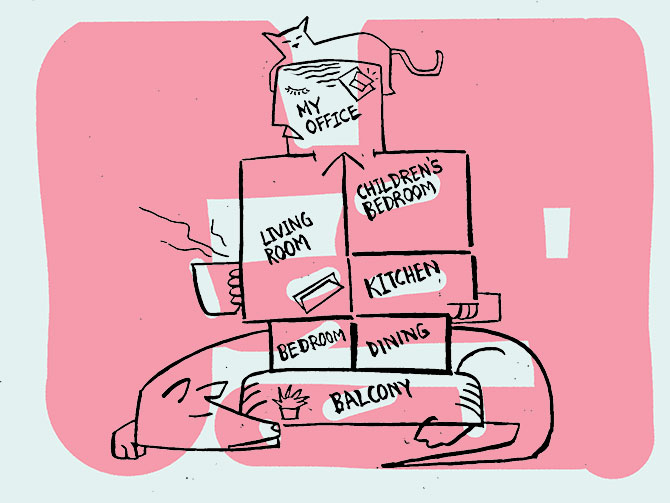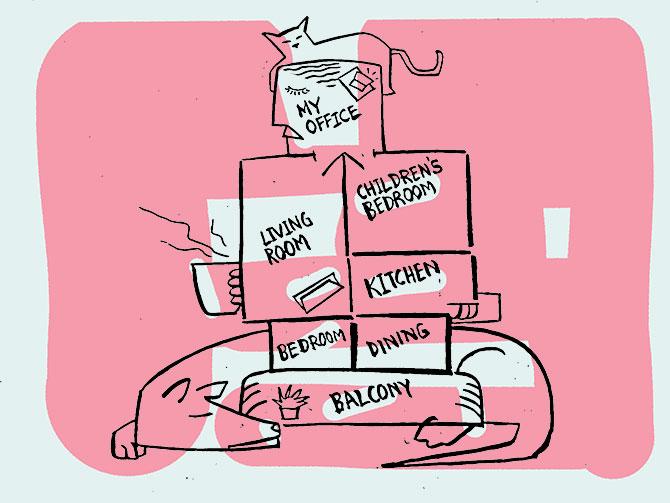86 per cent of professionals in India believe that a hybrid work model will help them strike the right balance between their personal and professional lives.
One in three professionals in India is burnt out due to increased workload and stress, as the pandemic forces them to work remotely, even as the majority of the workforce feels they would want to return to work in some form, a study by professional network LinkedIn has found.
LinkedIn on Tuesday launched findings of the “Future of Work” perception study by research firm Censuswide that focuses on the insights of 1,108 respondents in the age group of 16 to 68, who have worked from home during the pandemic due to Covid-19 restrictions.
The survey captures the sentiment of the Indian workforce towards the impact of remote work, their plans to return to work, and work model preferences for the future.
The study dives deep to understand how working remotely is leading to burnout amongst professionals in India and leaving them hopeful for an office reboot.
Among the top findings of the survey is that 86 per cent of professionals in India believe that a hybrid work model will help them strike the right balance between their personal and professional lives.
As many as 35 per cent respondents said they have experienced increased workload working from home, and 34 per cent said they experienced stress.
To shelter from such distressing times, professionals are prioritising their well-being and finding ways to strike the right balance.
In fact, half of India’s workforce believes that work-life balance (52 per cent) is just as important as their salary (52 per cent) today.
The study also found that nearly 9 in 10, or 86 per cent respondents think that hybrid work will positively impact their work-life balance.
When asked why, 48 per cent said that a hybrid model would allow them to spend equal time on their personal goals and professional lives.
“Long-term remote work has left professionals fatigued in India.
“This has caused a shift in the idea of what is important in our lives and has led to what we call ‘The Great Talent Reshuffle’. Organizations are rethinking their entire work models, culture, and values, while employees are rethinking not just how they work, but why they work.
“At this time, we encourage companies to explore stronger flexible offerings and more mental health time off, as professionals are now seeking a greater balance and more fulfilment in their lives,” said Ashutosh Gupta, India country manager, LinkedIn.
Hybrid work or not, professionals in India are keen to go back to the office.
The study shows that 72 per cent respondents think working from home would negatively impact their career growth while more than half (55 per cent) said their professional learnings had already taken a severe hit.
Responding to the reason, 54 per cent said “less face-time with bosses and leaders”, while one-thirds (34 per cent) said “it gets harder to learn from peers remotely”.
The study further reveals that nearly half of India’s workforce wants to go back to the office, full time, because it makes them feel more productive and successful in a workplace setting.
As many as 71 per cent respondents agreed that those who choose to work more from the office are more likely to be favoured by bosses or leaders, while an overwhelming 89 per cent professionals also think going back to the workplace will help their finances because it will allow them to work more hours and make more money.
On a lighter note, the study also finds that 72 per cent want to go back because they don’t want to miss out on the fun while 50 per cent say they simply enjoy being around other people and colleagues.
Working from home has had benefits for workers too.
The study shows that more than 9 in 10, or 93 per cent professionals said that working from home during the pandemic has positively impacted their physical health.
As many as 58 per cent professionals feel healthier, not eating as much takeaway food, while 51 per cent found extra time to exercise more frequently when working remotely.
In fact, 2 in 5 professionals say they want to work remotely going forward because it allows them to “choose work hours and location” (42 per cent), and “spend more time with their loved ones” (39 per cent).
Using the hashtag #FindTheBalance, LinkedIn also ran a campaign to hear from from people on how they are dealing with the current times.
“Have something that gives you thinking time and me-time. For me, it’s my daily meditation,” Vani Kola, managing director at Kalaari Capital, said on her LinkedIn profile.
For Ankur Warikoo, founder Nearbuy.com, a regimented schedule has worked best.
He wrote, “Having dinner by 6.30 pm, and winding down with family after that; and going to bed by 9.30 pm, that sets up for a balanced next day.”
“The last year and a half has been crazy,” wrote marketing and sales professional, Sampark A. Sachdeva.
“While work from home has its pros of cutting out the travel time and giving us a little more flexibility, it also has its cons with people now going through WFH Fatigue.
“Stress, anxiety and uncertainty has become the norm and a lot of us don’t even realise it.”
Source: Read Full Article

